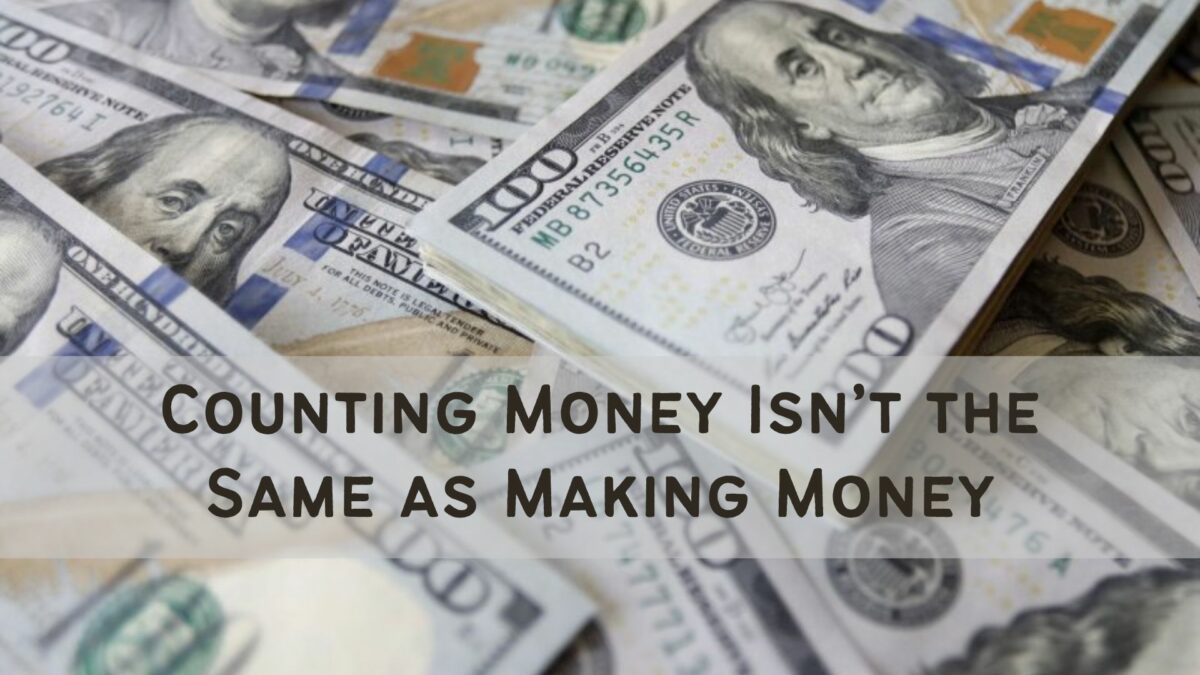“One…two…three…”
–The Count
I’m a pretty laid-back person. It takes a lot to rile me up, and, in actuality, there just aren’t that many things in the world that get my heart beating faster. I’m pretty much the definition of Type B, which made life in the military rather interesting and caused endless angst during Department of Defense clearance inspections for my last company because my idea of organization was to use the search functionality in my computer to find something.
There are a few things, though, where that small section of my brain which is Type A has its say. I am crazy about making sure that there’s no toothpaste on the rim of the tube because if there is, it makes the cap twist on strangely and mess things up. I’m also obsessive about rigorously entering every transaction from a side account and moving the money from the side account to our spending account as soon as feasibly possible. I’ll be at the doctor’s office transferring money via my USAA mobile app BEFORE handing the receptionist the debit card to pay the $10 copay. I get what I want, and the poor people behind me in line have just wasted five minutes of their lives which they’ll never get back because of my obsession.
Every month, at the beginning of the month, we create that month’s budget. While some esteemed authors believe you don’t need a budget, we’ve found that when we don’t put some guidelines out there, we tend to let Monkey Brain run the checkbook and are never happy with the results. So, dutifully, every month, I’m adding a new tab to the budget spreadsheet so that we don’t let Monkey Brain play money manager for us. I do the same thing with our value cost averaging investments, giving myself 10 minutes of self-delusion of thinking I’m a mad wizard of the markets, even though we’re investing in the same. index. funds. every. time.
I get a perverse pleasure out of this spreadsheet manipulation. By moving the shells around, I feel like I’m doing something positive in contributing to our overall net worth. While I am contributing because the budgeting exercise ensures that we’re investing and spending less than we earn, I’m not adding anything to the bottom line through this practice.
However, even though I feel like I’ve accomplished a lot once I do the budgeting process, I have only contributed a very small amount to our overall financial goals. Yet, I want to pat myself on the back far more than is warranted by the impact of doing budgeting.
Why do I feel this way?

- Mental accounting. Because I can move money into different buckets for spending, I feel like I’ve created value where there was none previously. Each month, the side account balances go up, until, of course, we need the money for the specified purpose. This allows me to focus on these small, relatively insignificant amounts while taking my eye off of the one number that truly matters – net worth.
- Monkey Brain confuses activity for results. At the company I founded, if we had people who seemed always busy but never seemed to be able to deliver, we called it a problem of “all thrust, no vector.” It was similar to how I played the game Asteroids when I was a little kid – I’d spin the spaceship around and around, shooting wildly, and occasionally hyperjumping. I rarely lasted long, but it seemed like I was doing a lot. The same happens when we’re engaged in these necessary but insufficient activities. We confuse the fact that we’ve accomplished an activity that is necessary to succeed with doing everything we have to in order to succeed with our priorities in life.
- Allocating money is easier than making money. For almost all of us, making money is hard work. There aren’t that many people who are truly money attractors who can make money effortlessly. Even the ones who make it seem effortless (Jay Z comes to mind) work their rear ends off to get to that point. Monkey Brain doesn’t like hard work, so he’s going to choose the tasks that are easiest and then make a big deal out of doing them to avoid the hard stuff.
Winning with money requires that you know where your money is going, but it also requires more than that. It requires intelligently saving and investing the money and it requires going out and earning more money if you can. Silas Marner may have counted his money every night, but unless he worked during the day, the number of coins he counted didn’t increase. Make sure that you’re doing the things that increase the number of coins before you focus on counting the number of coins.
Are there things that you do that you feel like giving yourself a huge pat on the back for that don’t actually move the needle much? Let’s talk about it in the comments below!
Author Profile
- John Davis is a nationally recognized expert on credit reporting, credit scoring, and identity theft. He has written four books about his expertise in the field and has been featured extensively in numerous media outlets such as The Wall Street Journal, The Washington Post, CNN, CBS News, CNBC, Fox Business, and many more. With over 20 years of experience helping consumers understand their credit and identity protection rights, John is passionate about empowering people to take control of their finances. He works with financial institutions to develop consumer-friendly policies that promote financial literacy and responsible borrowing habits.
Latest entries
 Low Income GrantsSeptember 25, 2023How to Get a Free Government Phone: A Step-by-Step Guide
Low Income GrantsSeptember 25, 2023How to Get a Free Government Phone: A Step-by-Step Guide Low Income GrantsSeptember 25, 2023Dental Charities That Help With Dental Costs
Low Income GrantsSeptember 25, 2023Dental Charities That Help With Dental Costs Low Income GrantsSeptember 25, 2023Low-Cost Hearing Aids for Seniors: A Comprehensive Guide
Low Income GrantsSeptember 25, 2023Low-Cost Hearing Aids for Seniors: A Comprehensive Guide Low Income GrantsSeptember 25, 2023Second Chance Apartments that Accept Evictions: A Comprehensive Guide
Low Income GrantsSeptember 25, 2023Second Chance Apartments that Accept Evictions: A Comprehensive Guide

